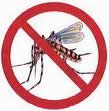What is dengue fever?
 Dengue fever is a disease caused by a family of viruses that are transmitted by mosquitoes. It is an acute illness of sudden onset that usually follows a benign course with symptoms such as headache, fever, exhaustion, severe muscle and joint pain, swollen glands (lymphadenopathy), and rash. The presence (the "dengue triad") of fever, rash, and headache (and other pains) is particularly characteristic of dengue. Other signs of dengue fever include bleeding gums, severe pain behind the eyes, and red palms and soles.
Dengue fever is a disease caused by a family of viruses that are transmitted by mosquitoes. It is an acute illness of sudden onset that usually follows a benign course with symptoms such as headache, fever, exhaustion, severe muscle and joint pain, swollen glands (lymphadenopathy), and rash. The presence (the "dengue triad") of fever, rash, and headache (and other pains) is particularly characteristic of dengue. Other signs of dengue fever include bleeding gums, severe pain behind the eyes, and red palms and soles.
Dengue (pronounced DENG-gay) strikes people with low levels of immunity. Because it is caused by one of four serotypes of virus, it is possible to get dengue fever multiple times. However, an attack of dengue produces immunity for a lifetime to that particular serotype to which the patient was exposed.









